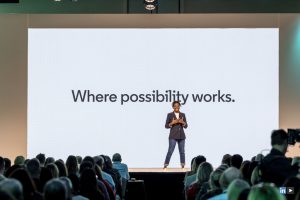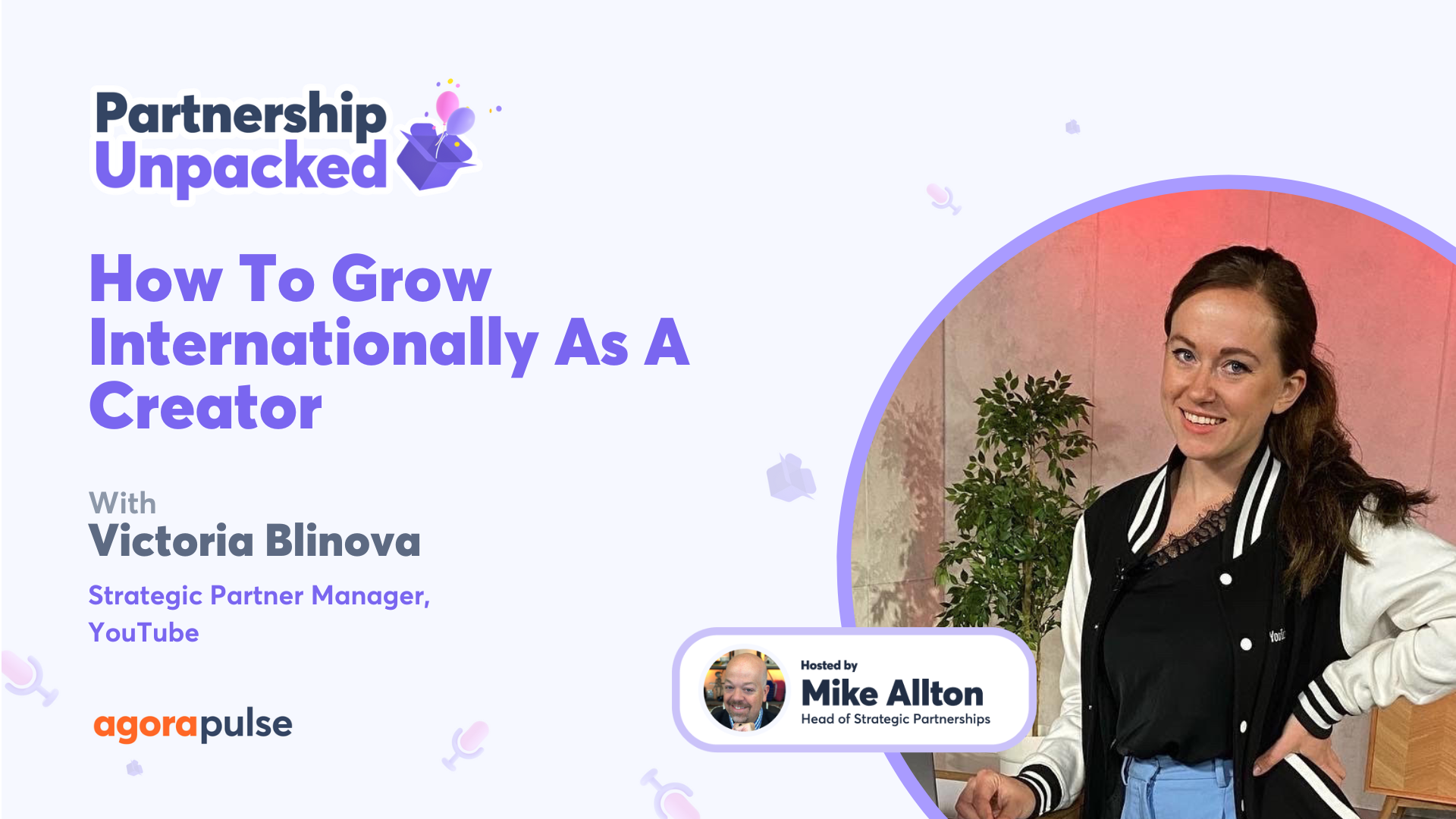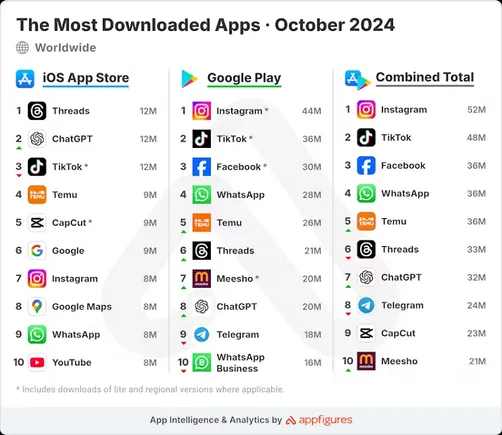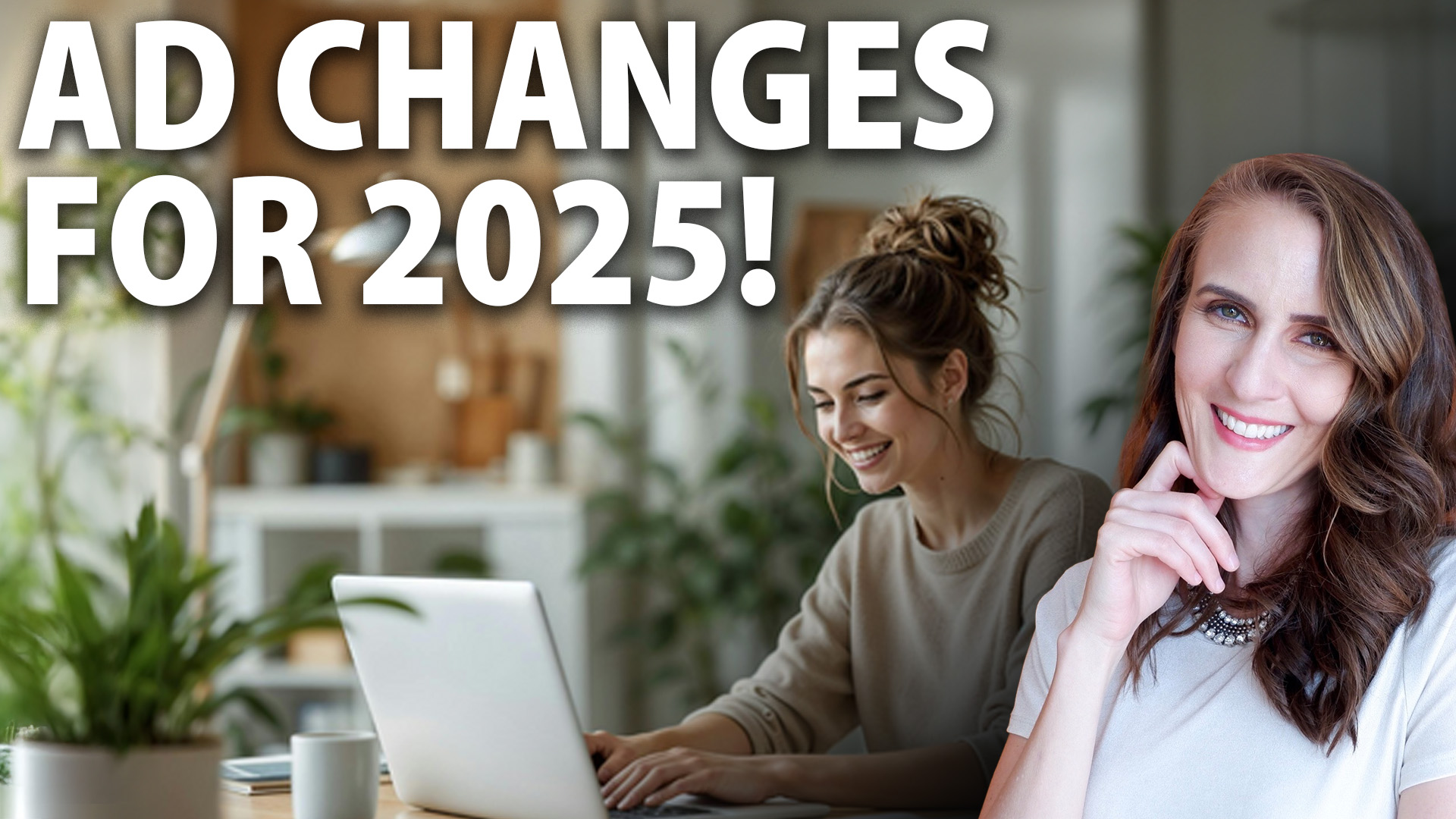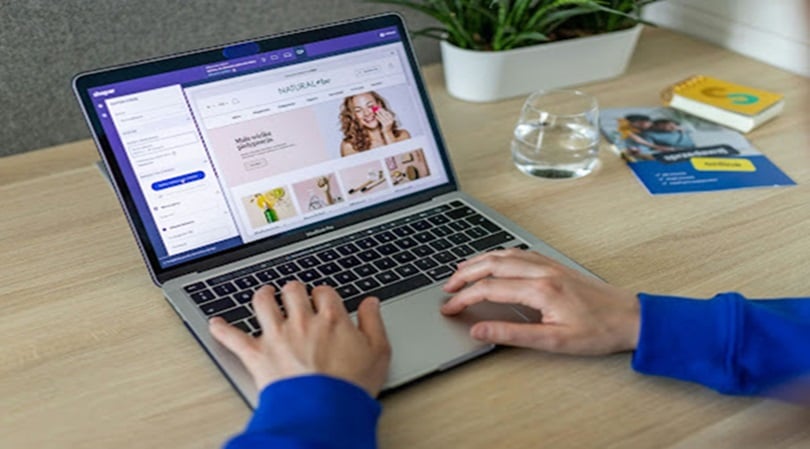If you want to become a creator and influencer today, you have a tremendous number of options when it comes to platforms and formats.
Do you focus on short-form content on X or Threads?
Do you spend your time crafting vertical videos for TikTok or YouTube Shorts?
Or do you invest more time in long form video content for YouTube, or even podcasts like this one?
And regardless of which platform and format you choose, you will have an opportunity to reach a global audience and international brands to potentially partner with.
How do we make good strategic choices here?
That’s what we’re covering in today’s episode of Partnership Unpacked.
Welcome back to Partnership Unpacked, where I selfishly use this time to pick the brains of experts at strategic partnerships, channel programs, affiliates, influencer marketing, and relationship building… oh, and you get to learn too! Subscribe to learn how you can amplify your growth strategy – with a solid takeaway every episode from partnership experts in the industry.
And we’ve talked a lot about influencer marketing, how to set up contracts, navigate developments in artificial intelligence, and even how the Hollywood strikes had an impact.
What we haven’t explored at all is the reality that social media audiences are global audiences, and savvy creators are aware of that and can even leverage those distinctions.
But how?
That’s exactly what Victoria Blinova is going to talk to us about.
Victoria has managed multimillion dollar budgets for C-level executives, has led digital marketing for the B2B business of Nestlé, and is the Strategic Partner Manager for YouTube. She’s a co-founder and consultant and has leveraged her experience in marketing, influence, and partnerships to help creators and entrepreneurs around the world.
Partnership Unpacked host Mike Allton talked to Victoria Blinova about:
♉️ How creators can grow their community on different platforms
♉️ How creators can work with key international brands
♉️ How to build your influence across international borders
Subscribe to the show calendar: agorapulse.com/calendar
Learn more about Victoria Blinova
Resources & Brands mentioned in this episode
Full Notes & Transcript:
(Lightly edited)
How To Grow Internationally As A Creator with Victoria Blinova
How To Grow Internationally As A Creator with Victoria Blinova
[00:00:00] Mike Allton: If you want to become a creator and influencer today, you’ve got a tremendous number of options when it comes to platforms and formats. Do you focus on short form content on X or threads? Do you spend your time crafting vertical videos for TikTok or YouTube shorts, or do you invest more time in long form video content for YouTube or even.
Podcasts like this one, and regardless of which platform and format you choose, you’ll have an opportunity to reach a global audience and international brands to potentially partner with. How do we make good strategic choices here? Well, that’s what we’re covering in today’s episode of Partnership Unpacked.
This is Partnership Unpacked, your go to guide to growing your business through partnerships quickly. I’m your host, Mike Alton. And each episode unpacks the winning strategies and latest trends from influencer marketing to brand partnerships and ideas that you can apply to your own business to grow exponentially.
And now the rest of today’s episode. Welcome back to Partnership Unpacked where I selfishly use this time to pick the brains of experts at strategic partnerships, channel programs, affiliates, influencer marketing, and relationship building. Oh. And you get to learn to subscribe to learn how you can amplify your growth strategy with a solid takeaway every episode from partnership experts in the industry.
And we’ve talked a lot about influencer marketing, how to set up contracts, how to navigate developments in artificial intelligence, and even how the Hollywood strikes have had an impact. But we haven’t explored at all is the reality that social media audiences are global audiences and savvy creators are aware of that and can even leverage those distinctions.
But how? Well, that’s exactly what Victoria Blanova is going to talk to us about. Victoria has managed multi million dollar budgets for C level executives, has led digital marketing for the B2B business of Nestle, and is the strategic partner manager for YouTube. She’s a co founder and consultant, and has leveraged her experience in marketing, influence, and partnerships to help creators and entrepreneurs around the world.
Hey, Victoria, welcome to the show.
[00:02:16] Victoria Blinova: Hi, Mike. It’s great to see you. [00:02:19] Mike Allton: Thanks for being here. Now, it’d be great if you could share just a little bit more about what you do at YouTube and then really dive into the work that you’re doing to help creators and influencers personally. [00:02:29] Victoria Blinova: Sure. At YouTube, I’m Strategic Partner Manager.
I work with one of the markets in EMEA. And what I do specifically is work with amazing creators all around the region to welcome them to YouTube essentially. So that’s the partnerships that encompass for us is actually working with the most awesome creators out there.
[00:02:51] Mike Allton: Awesome. Now, but you also work with individuals through your own business.
Can you tell us a little bit more about that?
[00:02:57] Victoria Blinova: Sure. In short, I also, well, What I like to say is I like to walk the talk, so I also build a community, a very small one on Instagram where I used to and also one on LinkedIn. So essentially through LinkedIn, I work on Blogging or let’s say writing posts regularly in relation to business.
And I think through that, quite often some startups, uh, come over for advice. Sometimes individuals where they sometimes consult them on, uh, strategies to build their communities on LinkedIn, sometimes other platforms as well.
[00:03:35] Mike Allton: Love it. And I love that you’ve got that big brand experience. But like you said, you’re also walking the talk.
You are also an individual creator. And so you’re living a lot of that same life. And so let’s talk about community because creators today, they’ve got a lot of options when it comes to platforms and content formats. How do you recommend they actually grow a community today?
[00:03:56] Victoria Blinova: Yeah, well, um, It’s a really, really good point.
I think I want to jump into the answer, but I guess I’ll, uh, start with a broad concept, which I think is actually really important today. I think with social and online presence, we’re bombarded with content from all over the place. I mean, if we look at ads, what’s the typical stat is that 000 ads a day.
I know no one believes that, but. Essentially we do, I don’t know what’s number Mike, feel free to correct me, but there’s just so much clutter in a way, or let’s say content that, you know, you wake up, you look at your phone, you scroll for X amount of minutes. Uh, you get up, I don’t know, you read the news again.
There’s a few ads and content here and there. You walk down the street and you see 10 billboards, if not 20 or 30, then there’s a bicycle next to you. I’m in London, so we definitely see a lot of bicycles. And that one also has an ad, I don’t know, by the time you get to your office. You see, yeah, X amount of ads and content.
What I’m trying to say is in this world of overwhelm of content, how do you stand out? And we can talk about strategies and here and there and that, but what I’m trying to talk about overall is potentially authenticity. And this is where a community comes into place. So if you have a community, you’re genuinely connected to An X amount of people, like a group of people, your audience.
And this is when that comes into play. And when you have that community, you have that authenticity, you have that connection with your audience that makes you stand out out of that, you know, thousands and thousands of content pieces that everyone sees every day. Does that make sense?
[00:05:38] Mike Allton: Yeah, and that’s such a terrific point.
I’m glad you brought that up because as a business, as a brand, as a content creator, I may be thinking about my podcast as a piece of content, and I may be focused on that content type, but the consumers, our target audience, To your point, they’re not only looking at podcasts, they’re being bombarded by ads, books, newspapers, emails, social media posts.
It’s all content. It’s all texts and images and audio that’s coming at them and demanding their attention. So as a content creator, we need to set ourselves apart and we do that through that connection. I love that you brought that up. It’s a terrific point. And one of the things that I know you’re really passionate about is.
Enabling and empowering more women in this space. But why do you think there aren’t more women creators on these platforms? And more importantly, what can brands and maybe even other influencers and creators do to help change that fact?
[00:06:37] Victoria Blinova: Yeah, well, it’s a tricky point, and I think I wish there was a Easy answer to why, and then also a very easy and straightforward solution, if that makes sense, because if I had all the answers and all the solutions, we would have implemented them by now and the world would have been a bit different.
But if to look at it, I think it all depends by market and let’s say also, let’s say vertical or type of product. Let’s say in some types of content, there’s plenty of women, let’s say beauty. That’s. Let’s say it would be a stereotypical one and beauty and fashion. That’s definitely somewhere where females are present.
But then if we look at across the board sports, right, pretty much any other verticals, like it is a bit of a challenge to answer your question. Why it seems that, you know, less women are out there building communities and becoming content creators. It could be a multitude of things. Starting from, let’s say, the stigma behind content creation, as I think a lot of content creators would resonate with this as, you know, the fear behind starting out the fear behind starting with 10 subscribers, 10 followers, whatever it is, and constantly, you know, experiencing some level of self judgment and, you know, judgment within the community.
Potentially, there might be research or some argument that, let’s say, women rely on their communities and don’t want to feel uncomfortable or feel like they’re going against what their community wants them to do, if that makes sense. And let’s say we can argue that, let’s say, some males are a bit more, you know, incentivized to do so.
Let’s say a typical example, you know, maybe a woman needs to be a bit more, you know, focused on her family, or You know, whatever the stereotype that is, or go some kind of line, linear trajectory in her life. Whereas Content creation is definitely something very, very, very unique or no longer as unique as an, uh, greater economy has been growing and potentially we can argue that that’s the reason.
Another reason I’d see is just content creation is not easy, right? So I think that’s one of the biggest stereotypes. Is that there’s a whole meme, I think, running all around LinkedIn and online and it’s like, what’s a job that everyone thinks is very easy and it’s actually not, and it is content creation.
And I do think content creation is difficult. I’m, I am saying it’s fun. Most of the time. It’s definitely fun. It’s definitely very interesting, but it doesn’t mean it’s easy. I’ve seen a mother content creator creating content in front of me, family content, it took her literally. I think 20 minutes to allow her son to come down and sit down in his chair to be able to take a photo, not even a video of him.
And this is the type of content that usually, you know, works really well. And this is the life of a family content creator, right? And typically women. So what I’m trying to say here is that it’s definitely very, very difficult and potentially, unfortunately, like in other industries in the workforce, potentially women might not have the support they need to go ahead, you know, even with this podcast, Mike, I don’t know your life situation.
Let’s say if you’re in a partnership as in relationship and so on. If it’s full time or not, where, uh, your partner usually needs to support you in your part time thing that you’re starting out before you’re going full time. That’s usually the trajectory of a content creator and potentially maybe women have a bit less support.
Again, I don’t have data right now to wrap my mind around to give you, but. I can’t say that, uh, yeah, unfortunately we don’t have enough females and I can only, you know, drop out, like, draw out these hypotheses. And then the last hypothesis is that the stigma. So in some societies, in some countries, in some regions, Like them showing their face or, you know, doing a dance, whatever it is, cooking, whatever it is, it’s to a point where sometimes someone wants to do a cooking show, and then they’ll get a comment saying, Oh, you’re perpetrating a negative stereotype of women cooking, you know, it’s just, it’s like, can’t make everyone happy.
And you’ll still get that those type of comments, no matter what. And unfortunately, the. Sometimes women get more of that because again, it goes to my first, where it seems like women are expected to have a more linear career sometimes. And I’m not saying that’s probably a similar case with men, but it is definitely like a, a new industry or a new career path and just tricky to enter.
And it seems like there’s a bit of a divide.
[00:11:24] Mike Allton: Sadly, that makes a lot of sense. I particularly honed in on the point you made about having a support system because one of the things that we also know from statistics is that women, generally speaking, are underpaid for being in the same roles as men.
They’re paid much, much less, which means they’ve got less financial freedom to your point to start up maybe on the side, a new content creation hobby, which, you know, most of these, I don’t mean a hobby, but you know, a new startup That requires some investment, right? If you’re gonna be a content creator, you’re gonna need some equipment, you’re going to need some software, maybe a website, all these kinds of things.
There’s a budget that needs to be applied there. So that that’s potentially one of the major issues, I think, to me,
[00:12:08] Victoria Blinova: it’s definitely potentially the financial aspect of it. But also time. Time is a huge investment. I mean, to create quality content and grow, you need it. Hours every week, if not every day, you really, really need to put back that time.
And depending where the woman is in her life, in a partnership, she could potentially very often be taking care of her parents. And if she’s not taking care of her parents, she’s probably taking care of her children. And if she’s not taking care of that, she’s probably taking care of her siblings. It’s in a way, there is a bit of divide quite often also with time.
And actually what ends up being is a lot of content creators that I’ve seen women, they are doing content creation, by the way, and they get judged for that around, let’s say, makeup or skincare. And I was told, well, well, you know, they’re earning so much money doing these things and they do the content so fast.
And I’m like, yeah, because she’s, she has kids in her other room. So she’s just literally filming herself, putting on makeup because she doesn’t have time to do anything else. And, you know, so it’s. You know, I actually thought of that right now. Yeah, that maybe women are leaning into these verticals so deeply is because of time management.
So yeah, or they’re family creators very often, because again, they’re spent very often. Obviously, it’s a stereotype, but very often women are the caretakers of their family. So again, a lot of our content creation would be around kids. And then again, you know, let’s say, Look at another vertical, let’s say it would be like tech, you know, putting apart that computer and talking about it and, you know, filming every single detail probably takes a bit longer than, you know, putting on and taking off your makeup.
So yeah, not to say again, like I’m not trying to put down any beauty creators. I know it’s an art and it’s a beautiful, beautiful art, but yeah, it’s quite interesting how I think we. Sometimes you don’t see the invisible cost behind content creation, the financial one, and time is a huge one.
[00:14:08] Mike Allton: Yeah, that’s a huge point.
One of the best influencers on Amazon that I’ve seen is a mom who is sharing stuff that she’s already got around the house. Right. So it’s relating to other parents, you know, but she goes into the pantry and she pulls out a blender that she’s probably had for years and says, this is the blender. This is how I use it.
Here’s all the parts and here’s where you can get it on Amazon. And it’s what she’s got time to do. So it makes complete sense in other industries. Yeah. Like you said, it takes a lot more time.
[00:14:39] Victoria Blinova: Yeah, yeah, yeah. Or, um, I know a content creator that is, let’s say, a teacher. And essentially what she does is she summarizes the classes, I think, that she already teaches during the day.
And then she sits down in the evening and quickly summarizes them. And, you know, that’s it. It’s quite interesting. And I think actually also depending on the region, it’s time, but there’s also a stigma part out of it also. So yeah, it’s quite a few boundaries, like walls or, wait, there’s a word for it. To you know, to break through and
[00:15:10] Mike Allton: yeah, a lot of barriers, right?
Like I’m in the marketing tech industry. Martek aren’t a ton of women. There are amazing women in this industry, but there aren’t a lot of them. So one of the things that I’ve tried to do is Shine a light on those, those women creators and those particular speakers in my industry. I’ve done blog posts, roundups, and that kind of thing that really featured them.
When I run virtual summits, I’m looking to get mostly women speakers at my summits. Have you seen any other brands or influencers doing collaborative work like that to help promote women?
[00:15:45] Victoria Blinova: Yeah. To be honest, I’ve seen quite a bit of an issue a lot, I would say. We would also almost be opposite where it’s hard to find a big brand that doesn’t try, but that’s the key word is try, I think it is a challenge.
It’s also important to bear and in the way you execute your support is key. So I’d say most companies I know have some sort of initiative for work to educate women if it’s something related to employment or in a way Find these opportunities for them, create these opportunities for them, create these communities, like we mentioned in the beginning, where it’s just so important to support, but also make sure it’s an ongoing topic and that’s usually ignited their community.
[00:16:35] Mike Allton: Awesome. Awesome. Well we touched on how lucrative it can be to be a creator a moment ago. Obviously a lot of people influencers for those monetary reasons, but there’s so much more value that being a creator can bring. Can you speak to that? [00:16:50] Victoria Blinova: I think that most huge creators are not so huge creators. Most creators that I’ve spoken to, worked with, always do it because of the community.
And always do it because of the community. And if anyone ever asks me if they should be an influencer, which is quite a common question, or I quite often try to ask them why they’re interested in it. And if the answer is they’re interested in creating content. And that’s what their core and they want people to see that content.
I just basically say, go ahead, just go, go, go, go, go. When someone tells me that, you know, they’re want to be like one of those influencers in a Lamborghini or whatever it is, and going there essentially for the money or basically going down the rabbit hole of perception, that is an easy job. It’s a fun job, but it’s not an easy job.
Then I typically. Try to explain that it’s not an easy job and there are some significant downsides to it in a way, because it’s not an easy job. And if you’re going for the money, I don’t recommend. And then in general, honestly, I’d say almost any job, however, stereotypical sounds, it’s quite important.
You like it because if you’re going for the money, I just don’t believe it’s very sustainable, especially honestly with content creation. I don’t know if I’m answering your question fully. Do you mind repeating it?
[00:18:11] Mike Allton: No, no, no. That’s actually it. I mean, you touched on exactly. You’re not going to want to get into this kind of work into any kind of work unless it’s something you love and unless it’s something you’re passionate about and unless you’re getting something out of it well beyond the money.
So when we’re talking about influencers and creators, typically not in every case, but typically it’s about building the community. It’s about helping the community by giving back in some way. Thank you. Through their content. Now, I want to share a quick message from our CMO at Agorapulse, because a lot of the folks that are listening to this, they’re ignoring social media completely as a channel, they’re investing their time in blog posts and in paid advertising and an email marketing, because they can measure what that does for them.
And they have a hard time measuring what social media does for the brand. For you folks, I’ve got a message.
[00:19:01] Darryl Praill: It’s the Arc de Triomphe. Can you imagine if you’re in charge, if you’re the CMO. Of marketing Paris. What are your main channels? Well, there’s the Arc de Triomphe. There’s the Eiffel Tower. There’s the Louvre.
Those are your channels you’re going to use to drive tourism dollars in. Okay, now, but you’re not the CMO of Paris. In fact, you’re the CMO of your company. Product, service. So what are your main channels? Well, I’m going to guess they’re things like pay per click. Maybe trade shows events. Maybe content.
Those are all pretty predictable, right? Let me ask you this question. Are you treating social media as a main channel? By the way, only 1. 8 percent of you today measure social media and can prove an ROI in that investment. HubSpot and Gartner say social media is the number one channel to invest in this year.
Are you doing it? If not, I can tell you why you’re not doing it because you don’t have the tools. You don’t have the mentality and that’s okay. We’ve got you covered. You change the mentality. We’ll give you the tool. Burpulse tracks all the ROI for you. One place to manage all your social media activity.
Your number one channel. Change your success. Treat social media as channel. One CMO to another. My name is Daryl. I’m with Agaral. I’ll talk to you soon.
[00:20:18] Mike Allton: Alright, now for my listening audience, what I just played was actually a video. And you can actually see in the video our Cmmo Darrell standing in front of the Arctic three at this giant circle in the Seane with all this traffic going around in the background. I mean, he was literally there in Paris.
’cause that’s where we based now, Victoria, I know you’re in London. I know you’ve done a lot of world traveling. Have you been to Paris before?
[00:20:39] Victoria Blinova: Yes. Yes. Multiple times. Yeah, [00:20:42] Mike Allton: it’s amazing. I’m in ST louis. So we’re all over the world right now. Even in this podcast, a creator who wants to reach. This is my segue to the question for a creator who wants audience and work with international brands.
How do you suggest they brand or pitch themselves?
[00:20:59] Victoria Blinova: Yeah, great question. And quite a complex one, to be honest. I think what is important is to make sure you have a community locally first, in my opinion. So just make sure you have a really, really, really strong community. And after that, the numbers usually speak for themselves, right?
Let’s say you have an amazing community in India. And they’re just doing fantastic, fantastic job. And in terms of you post a video, it does really well. You post a photo, it does really well. And you created a brand or you worked with a brand, it’s sold out. Just make sure you tell that story. So even though let’s say your audience is based in India and you’re a creator from, let’s say India, but let’s say you want to do.
Scale to the U S or UK, talk about what you’ve done locally and make sure to talk through numbers. Numbers are a great way to storytell. And that’s essentially the language of a brand, right? A brand is typically a business. They want to make sales or let’s say they want to create brand awareness. So tell that story and that’s one way.
So I’d say, and this is where you can reach out to different brands. Let’s say that have interest in your market as well. And then if that, and just keep trying, keep trying, keep trying to keep trying, because it will work out as long as you keep trying. But then the other point is, is maybe also to respond to Mike is, and how do you, you know, go from one market to another and, you know, really expand, think of what similarities there are out there.
Right. So let’s say you are. Let’s say we talk to a fashion creator and let’s take that same case of India. And you have a very strong community there. And then what if you have a community of people from India across the world? And why don’t you reach out to them or ask them what kind of content do they want you to create?
And again, if you have a strong community, it’s usually A constant dialogue, and they will tell you what they’re looking for. They will tell you, Oh, um, why don’t you come see the UK? We have a meetup there and we create X, Y, Z content together. There’s just so many great opportunities. Very often, your community will also tell you about events here and there.
And then all of a sudden, your community expands from just that local one to that community within, in the UK, in the U S and so on. And then all of a sudden, you know, maybe your community suggests. You to learn another language and start doing bits and pieces here and there. So there’s always these opportunities to really find similarities and lean into your community because they will help you shine.
Why? Because usually they’re really invested in your success and they want their friends to know about your content or they want to share your videos. Because they find them either incredibly entertaining or very helpful, very useful. So the short answer is lean into your community because they will help you give the clues to expand.
[00:23:53] Mike Allton: Four really fantastic pieces of advice. I’m going to go through them real quickly. I just want to make sure all of you listening heard everything that Victoria’s just said. First of all, you have to dive into analytics. You have to know, cause she said, recognizing where you’re, you are actually already.
Developing an audience and you’re not going to be able to tell that just by looking at your follower or subscriber count on your social network. You’ve got to dive into analytics and be able to identify that X markets are your largest markets. That’s the first step. Then you’ve got to be able to dive even more into analytics and be able to share those numbers, performance metrics and other kinds of stories.
With the brands that you want to work with so that they know I want to work with Mike He’s got this big of an audience in the uk Fantastic. Here’s what he’s actually done in the uk. That sounds great. That’s an influencer I want to work with The next step is to go back to the community and talk to them Not the communities that you’re necessarily strongest in but the ones that you want to break into if I want to break into the uk I go and I talk to my uk followers and connections there and learn from them.
What are they enjoying? How can I help them? And then the fourth step is to actually meet with them. So yeah, going to events, particularly events locally, if you can, fantastic advice. Love it.
[00:25:07] Victoria Blinova: Yeah, I’m happy to. And essentially, and even if you’re not traveling, you can’t travel. There are always connections that you can make virtually online that help you out very, very often.
I advise my creators to collaborate as in, uh, there will almost never will a creator have, and I mean, it’s basically pretty much impossible from just one country, right? There will always be an overlap. So, okay, I have some creators from the U. S. And, you know, 25 percent of them are from the UK. Oh, this other creator has 75 percent audience from the UK and 25 percent of them from the US.
Why don’t we collaborate so that they get more followers from that market and I get more followers from that market. And in between, we will actually learn from each other. I’ll teach them about American culture. They’ll teach me about British culture. And hey, and on top of that, we’re creating an awesome piece of content.
And that our audiences will both love. So always, always be on the lookout for that. And just like you mentioned the first point, it all starts with the numbers.
[00:26:12] Mike Allton: Love that. In fact, we were talking to Lee Oden from TopRack Marketing in a previous episode. And one of the stories he told and the points that he made was that if I’m a brand and I’m working.
On an influencer marketing campaign. Maybe I want to launch a new product or something like that. I could find an influencer. That’s a great fit. I work individual, but it’s so much more effective if I find two or more influencers and I work with them together and I have them collaborate with each other because then to your point, you’ve got overlap and melding and sharing and cross promotion of each other’s audiences.
And if you’re an influencer listening right now, Yeah. This is even more powerful for you because you should be looking for other influencers in your space, particularly if you want to break into new markets and you could be collaborating with them. So if you’re an influencer, Victoria, and you want to work with brands, whether you’re speaking or you’re working with them, what other advice do you have for them in these situations or others?
[00:27:10] Victoria Blinova: Interesting. I’d say actually probably be a surprising one, but I’d say focus and know what you want very often. Even myself as an influencer, but to be honest, I wasn’t doing it for the brand deals at least. Yeah. But if you are in this journey. of creation where you want to get those brand deals, get very specific, really, really know what you want.
There’s a recent quote that I’ve been really pondering on the last couple of months. Actually, it was, I think a quote from Oprah at one of her shows where she emphasized the fact that people who have achieved something have a very important point in common, and that is they know what they want. So with brand deals.
Just really know what you want. Let’s say you’re a culinary creator, creator in food, and you want a brand deal with, with Nestle, right? Be specific or like get your creative juices flowing. Like, Oh, I want to work with them with this product. Okay. How will you work with it? Will you like, what is their. As in, is it a family product?
Is it a product that focuses on women? Is it a product that focuses on a certain lifestyle? Okay. So why do you want to collaborate with them? Oh, because this and this, and you know, okay. And what are the numbers? So get really, really specific. Why? Am I mentioning this over and over again? Because the moment you get incredibly specific, you literally become the top candidate for this brand because you, all of a sudden you put together the work, the legwork needed for the brand to go, well, yeah, this is literally our dream candidate.
So essentially, let’s say you narrowed it down and you’re like, Oh, I want. Why KitKat? Because I mean, I always post funny videos about taking a break or like I’m, you know, I love being funny or whatever it is. And then and by the way, they tend to, you know, have family friendly kind of scenes and I can I’m a family creator.
And oh, they also care about like some angle of sustainability. I can also involve that and then all of a sudden you have a script, all of a sudden you have a post and all of a sudden. You know, you’re out there with an awesome pitch for the brand. I wouldn’t necessarily recommend like directly approaching all the time and going that method, but I would say, start preparing.
Okay. You have that idea for an essay. What other brands are you looking at? Okay. So you have those, you know, Several ideas, put that on your, um, page, but the content out there, as in very often, there’s this technique that some creators use where they almost produce fake ads or not fake ads are like showing that they’re ready for a collaboration.
So they’re either doing a funny video, or it’s like they are showing the compatibility they have with certain brands because they’re becoming more and more focused on what kind of operations they want. Yeah. And then last but not least, I’d say. Think about the business world. So I think there is sometimes a little bit of a divide between a full time content creator and marketing manager, right?
So if, let’s say, you’re a content creator that’s never been in a role of a marketing manager, a brand manager, you know, partnerships manager, and let’s say, have never been acquainted to their day to day life, you might feel like, Oh, why are they not answering my email? Or, you know. I sent them this awesome idea.
Like why am I not getting answered? This is not cool. But you know, try to a friend who’s a marketing manager and maybe talk about their day to day. And maybe you’ll find out that, Oh, this marketing manager gets 300 emails a day. And a few of them from creators who have awesome ideas. And maybe those creators actually have 10 people working for them and they actually crafted an insanely cool pitch.
So the competition sometimes is Really, really intense. Hey, but I also learned that, you know, marketing managers actually are upset that they don’t have cool ideas. So maybe if I send them a video that will really spark their interests, or maybe I can go to a marketing conference and meet a bunch of marketing managers there and literally just ask them what they’re looking for.
And, you know, that way stick out of, out of the crowd instead of sending emails all the time. I’d say. One, just be really, really, really prepared and really know what you want. And to get to know the world of marketing units and brand managers, whoever you’re focusing on and vice versa. Honestly, I know this is more for content creators, but I’d say to marketing managers, brand managers, partnerships, managers, also know your content creators.
Really, if you’re, you know, working with influencers all the time. Really try to befriend, really try to be part of their world. Try to create some content here and there because it is a bit of a different world. Right. And it’s important that we are able to connect to each other early, understand what our worlds are like, it can help and smoothen out the communication.
And then all of a sudden brand deals come into place and things become a bit more smoother.
[00:32:02] Mike Allton: The part you said about marketing managers getting hundreds of emails. Yeah. I felt that hard. I get over a thousand emails a day, so if you’re a content creator and you sent me this fantastic email, I guarantee you it’s still in my inbox.
You weren’t one of the 950 emails that I deleted, but I do have. Much to go through. It will take me a little time to get back to you, but you made just such a powerful point about being specific. I’ve been on both sides of this equation. I know if an influencer reaches out to me to do a campaign for a girl pulse and they say something like, Yeah, I’ll post on my instagram four times like Okay, say I’m gonna do a vertical video, and I’m gonna collaborate with Goldie Chan, and we’re gonna talk together about how important it is as social media managers to be able to step back from social media.
And it’s great to have a tool that can let us do that. Something like that, right? That’s Specific, you know, and it’s creative and they obviously put at least five seconds worth of thought into that idea And that’s so much more powerful. That’s the email that’s going to get a response right away from me
[00:33:06] Victoria Blinova: Yep.
Yep. And again not to discourage creators is again prepare for rejection Unfortunately, someone gets hundreds of emails out regularly to brands, reach out to them on social media, reach out to, you know, again, go on those conferences, whatever it is, if you have that one brand, you really want to work with, you know, then it’s probably worth, you know, multiple touch points as very often, you know, mentioned in sales world and so on, try to, you know, really, really understand who’s your, uh, let’s say committee of decision makers, talk to them, meet them as much as you can, as much as is appropriate, but you know, it’s okay to be rejected because again, Hundreds of emails are received every day.
It’s quite a cluttered world. Just like, you know, think of the feed, right? There’s so much videos out there. So then I imagine it’s quite tough to stand out, but that’s okay. That’s okay. Just to keep going, keep going. I mean, I have like a lot of fun stories about me cold emailing people in my life and waiting for two years and then getting something with after two years.
So I think it’s absolutely cool. Absolutely normal. If it’s a dream. Just keep going. And at some point you’re probably gonna get it.
[00:34:16] Mike Allton: That’s absolutely right. Because again, to your point, if you are a content creator, an influencer and you haven’t sat in our shoes as the brand who’s managing those kinds of activities, it’s tough to understand that the question isn’t solely about you, the content creator and what you are proposing to do.
Because as the manager of that kind of activity, I have to balance what else are we doing? What budget do we have? What are we doing? Right. Right. Priorities is a marketing company. What is our roadmap? What are we trying to focus on? What are our content themes for next quarter? What are the rest of my team doing?
What’s their available bandwidth? What are the commitments do we already have on the books? There’s so much more that has to go into that decision way above and beyond. Do I like you as a creator? And do I think you’re cool? And I think that’s a really creative idea, which all that probably is true. Most of the time I have to say no, and it’s got nothing to do with the influencer or the event that’s wants me to sponsor them or anything like that.
I have all these other, yeah,
[00:35:15] Victoria Blinova: the way I see this is like, it’s almost, it’s about building that relationship and then seeing when the right moment happens and very often, by the way, I think you can build that relationship online. I actually had a funny story once where I was following a creator as a decision, a great company, and I was liking their posts all the time because I just thought it was cool content.
And all of a sudden they reached out to me. And they’re like, yeah, I’m actually like really, really interested in partners. And I was like, Oh, yeah, why did I not think of them? And immediately, you know, I forwarded them and, and basically we had our relationship was me liking their posts, because I thought they had really cool content.
And I actually never really thought of. You know, collaborating, but then I’m like, Oh, yeah, like amazing content, like duh. And yeah, so again, you can also create that type of content online, like that kind of relationship online.
[00:36:06] Mike Allton: Couldn’t agree more. In fact, that’s the perfect segue to my last question. And this is my favorite question.
I ask this of every single one of my guests. And you’ve already kind of intimated it, but I want to hear what you had to say. How important have relationships been to you and your career?
[00:36:20] Victoria Blinova: I’d say relationships are everything, honestly. It’s basically everything. It’s what brings us a sense of purpose. It’s what keeps us connected, keeps us satisfied in life.
And because relationships are everything, in a way it’s important to apply it to every aspect of life. So… In work life, yes, it’s all about being objective and results and let’s say business KPIs, whatever we’re looking at, but at the end of the day, we’re all human. We’re all social beings, and we all want to have a pleasant day at work or after work and enjoy what we’re doing and be united by a certain mission and relationships are usually the foundation of that relationships is what keeps us going when it’s a bad rainy day.
Hashtag London relationships is what, you know, keeps. It’s like the conversation fun over cup of tea, hashtag London. But what I’m trying to say is, yeah, because relationships are so important to human nature is just key to keep that in mind when you are building your career, when you are looking for that business meeting, when you are trying to land that brand deal and there’s many strategies.
Go about that, but I just say like, yeah, it’s a kind of reminder that we’re all social beings and we like to be connected.
[00:37:41] Mike Allton: Fantastic. Victoria, this has been such a cool interview. You are so much fun. You’ve got so many terrific insights. Thank you so much. Can you share with everyone where they can find you, where they can reach out if they want to learn more? [00:37:55] Victoria Blinova: Sure. Thank you so much. First of all, it was a really, really great pleasure. So incredibly cool and professional and I love your questions. You can find me at Victoria Blinova on LinkedIn or Instagram or YouTube essentially. I’m most active on LinkedIn, so feel free to drop a message there. [00:38:15] Mike Allton: Fantastic.
We’ll have all the links in the show notes. Folks, please go and find Victoria and follow her and start connecting with her and building. That relationship and build those relationships with their brands too. Until next time. Thank you for listening to another episode of partnership unpacked hosted by Mike Alton and powered by Agorapulse the number one rated social media management solution, which you can learn more about at agorapulse.
com If you enjoyed this episode, please subscribe on your favorite podcast player. Be sure to leave us a review. Your feedback is important to us. And if you want to be part of our audience during live broadcasts, take a look at our calendar at agorapulse. com forward slash calendar.
Until next time.






